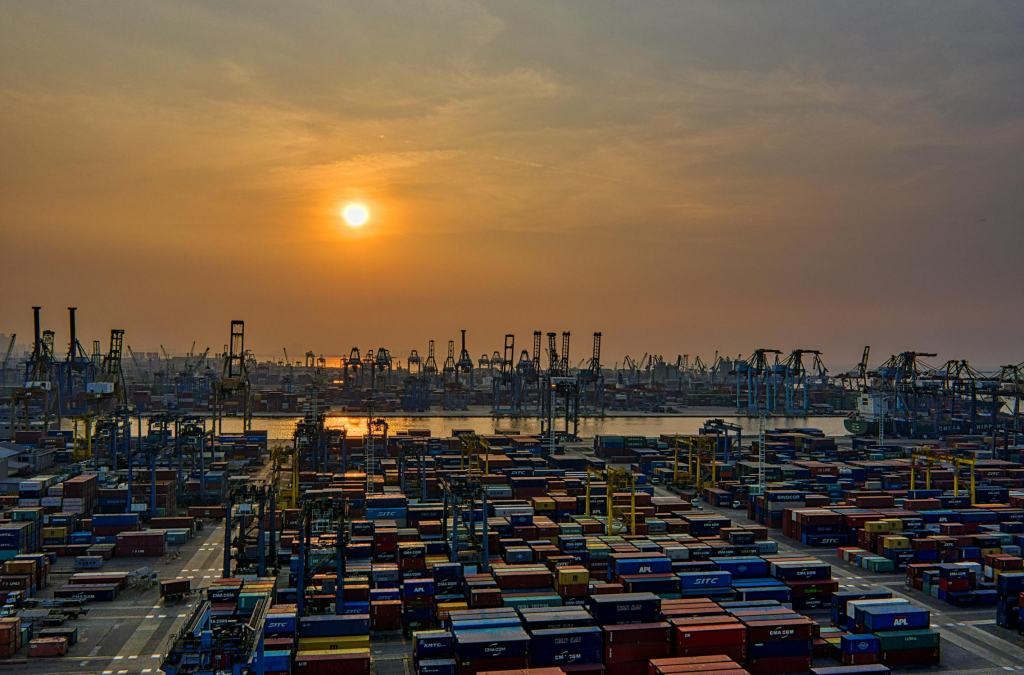A vital component of international trade, freight transit enables the conveyance of products, materials, and wares from one place to another. The logistics and supply chain ecology relies on diverse transportation modes, each with its distinct function. These modes include road, rail, air, sea, and inland waterways.

The smooth movement of commodities, which drives economic growth and guarantees the availability of goods in marketplaces across the globe, depends on freight transport systems’ efficiency and dependability. This article will delve into the several facets of freight transport, its importance, and the main transportation modalities that facilitate international trade.
What Is The Meaning Of Freight Transport?
Freight transport refers to the physical process of transporting goods, commodities, and merchandise from one location to another. This can be done via various modes of transportation, including:
- Road: Trucks and lorries transport goods over short and long distances on roads and highways.
- Rail: Trains carry bulk goods and containers over long distances on rail networks.
- Air: Cargo planes transport high-value and time-sensitive goods quickly over long distances.
- Sea: Ships and cargo vessels carry large volumes of goods, especially for international trade, over oceans and seas.
- Inland Waterways: Barges and boats transport goods via rivers and canals.
- Pipeline: Used primarily for transporting liquids and gases, such as oil and natural gas.
Freight transport is a critical component of supply chain management, ensuring that products reach their destinations efficiently and cost-effectively.
What Is An Example Of Freight Transport?
An example of freight transport is the shipment of consumer electronics from manufacturers in China to retail stores in the United States. This process typically involves multiple modes of transportation:
- Sea Freight: Large cargo ships transport containers filled with electronics from ports in China, such as Shanghai or Shenzhen, to major ports in the United States, like Los Angeles or Long Beach.
- Rail Freight: Upon arrival at the U.S. ports, some of these containers are transferred to trains, which carry them across the country to distribution centres.
- Road Freight: From distribution centres, trucks transport the goods to various retail stores or directly to consumers who have ordered online.
Each step of this process highlights different aspects of freight transport, showcasing the integration of sea, rail, and road transportation to deliver goods efficiently across vast distances.
What Is Freight Term In Shipping?
In shipping, a “freight term” refers to the conditions and terms under which goods are transported from the seller to the buyer. These terms dictate who is responsible for various costs, risks, and responsibilities during the shipping process. Commonly used freight terms include:
- FOB (Free On Board): Indicates that the seller is responsible for the goods until they are loaded onto the shipping vessel. The buyer takes responsibility once the goods are on board.
- CIF (Cost, Insurance, and Freight): The seller covers the cost of goods, insurance, and freight to bring them to the port of destination. The buyer assumes responsibility once the goods arrive at the destination port.
- EXW (Ex Works): The seller makes the goods available at their premises, and the buyer is responsible for all transportation costs and risks from that point onwards.
- DDP (Delivered Duty Paid): The seller is responsible for delivering the goods to the buyer’s location, including paying for all duties, taxes, and other charges associated with the delivery.
- FAS (Free Alongside Ship): The seller is responsible for delivering the goods alongside the vessel at the port of shipment. The buyer assumes responsibility once the goods are alongside the ship.
The International Chamber of Commerce (ICC) is responsible for standardizing several words, including these among others. These terms are frequently referred to as Incoterms, which stands for International Commercial words. When it comes to international trade, they help buyers and sellers better grasp their respective commitments and limit the number of misconceptions that occur.
Why Is Freight Transport Important?
Freight transport is crucial for several reasons:
- Economic Growth: Freight transport enables the movement of goods from producers to consumers, facilitating trade and commerce. This contributes significantly to economic growth by creating jobs, generating revenue, and fostering market expansion.
- Supply Chain Efficiency: Efficient freight transport is essential for maintaining smooth supply chains. It ensures that raw materials, components, and finished products are delivered on time, supporting manufacturing processes and retail operations.
- Global Trade: Freight transport connects markets across the world, enabling international trade. It allows countries to import and export goods, balancing supply and demand globally and giving consumers access to a wider range of products.
- Consumer Access: It ensures that consumers have access to a variety of goods, from everyday essentials to specialized products. Efficient freight transport helps keep store shelves stocked and supports the timely delivery of online purchases.
- Cost Management: By optimizing transportation routes and methods, businesses can reduce logistics costs. This can lead to lower prices for consumers and increased profitability for companies.
- Development and Connectivity: Freight transport infrastructure, such as roads, railways, ports, and airports, plays a critical role in regional development. It enhances connectivity, supports local businesses, and can lead to the development of new economic hubs.
- Disaster Relief and Humanitarian Aid: In times of crisis, efficient freight transport is vital for delivering emergency supplies, medical aid, and relief materials to affected areas quickly.
- Innovation and Technology: The need for efficient freight transport drives innovation in logistics and transportation technologies. This includes advancements in tracking systems, autonomous vehicles, and sustainable transportation solutions.
Freight transport is the backbone of modern economies, enabling the flow of goods, supporting businesses, and enhancing the quality of life for people worldwide.
Conclusion
As the backbone of international trade and commerce, freight transport is a crucial part of contemporary economies. It makes sure that raw materials to finished items may be moved smoothly across long distances, which helps the economy, the supply chain, and consumers get their hands on a variety of products.
Freight transit facilitates interconnection, which in turn stimulates regional growth, technical improvements, and worldwide trade.
In addition to being an integral part of our everyday lives, the significance of freight transportation stretches far beyond the field of economics altogether. The vast majority of the products that we use daily, ranging from the food that we consume to the electronic devices that we own, have been transported through complex logistical networks.
Both consumers and businesses should be able to afford the goods they purchase, and effective freight transportation systems can assist in keeping costs at a consistent level.
Innovation is greatly accelerated by the sector. The development of advanced tracking and logistics software, along with autonomous and electric cars, is a direct result of the ongoing effort to find transportation solutions that are more efficient, dependable, and environmentally friendly.
Not only do these advancements make freight transit more efficient, but they also help the environment by cutting down on energy use and emissions.
The significance of freight transit is only going to rise as international trade keeps on expanding. Businesses and lawmakers must prioritise sustainable practices, new technology adoption, and transportation infrastructure investment for a safe and reliable transportation system.
This way, we can make sure that freight transport keeps helping the economy grow, satisfying customer needs, and making the world a better, more connected place.
Looking for more information? Click and visit the anonymous.
